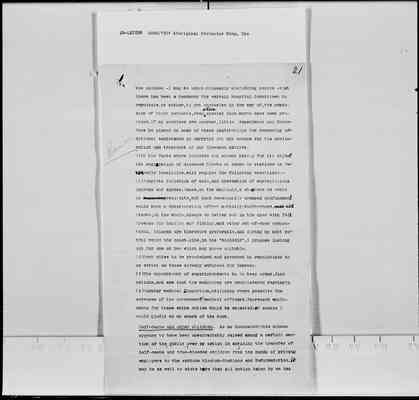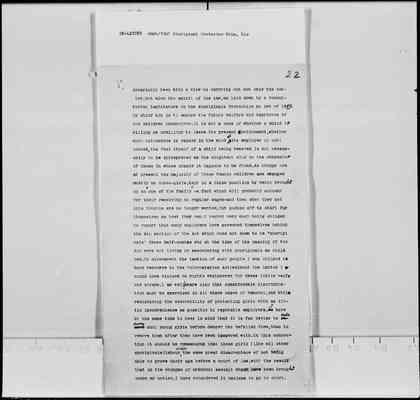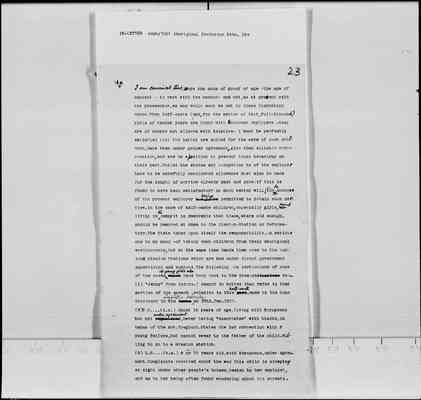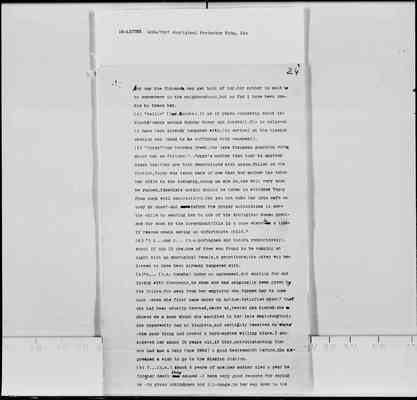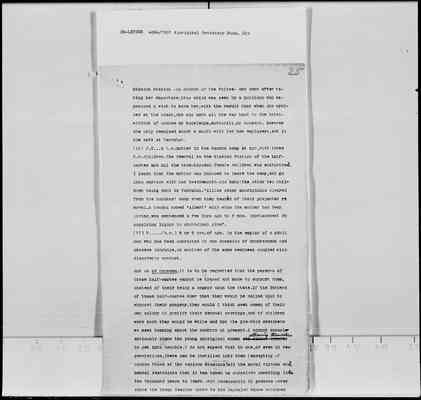Pages
21
IN-LETTER 4884/1901 Aboriginal Protector Nthn. Div
21
the opinion - I may be unintentionally misjudging people - that there has been a tendency for certain Hospital Committees to repudiate, or rather, to put obstacles in the way of, the admission of black patients, even where special lock-wards have been provided. If my surmises are correct, little dependence can therefore be placed on some of these institutions for rendering additional assistance in carrying out any scheme for the amelioration and treatment of our diseased natives.
With the fact above narrated any scheme having for its object the segregation of diseased blacks at camps or stations in favourable localities, will require the following essentials: -
(1) Complete isolation of site, and prevention of surreptitious ingress and egress. Hence, on the mainland, a stockade &c would be requisite, but such necessarily cramped confinement would have a deteriorating effect mentally: furthermore, sick blacks, on the whole, always do better out in the open with full freedom for hunting and fishing, and other out-of-door occupations. Islands are therefore preferable, and during my next patrol round the coast-line, in the "Melbidir", I propose looking out for one or two which may prove suitable.
(2) Such sites to be proclaimed and governed by regulations &c as strict as those already enforced for leprosy.
(3) The appointment of superintendents &c to keep order, find rations, and see that the medicines are administered regularly.
(4) Regular medical inspection, utilising where possible the services of the government medical officers. Increased emoluments for these extra duties would be expected: of course I would gladly do my share of the work.
Half-Caste and other children. As no inconsiderable animus appears to have been unwarrantably raised among a certain section of the public over my action in advising the transfer of half-caste and true-blooded children from the hands of private employers to the various Mission-Stations and Reformatories, it may be as well to state here that all action taken by me has
22
IN-LETTER 4884/1901 Aboriginal Protector Nthn. Div
22
invariably been with a view to carrying out not only the letter, but also the spirit of the law, as laid down by a humanitarian legislature in the Aboriginals Protection &c Act of 1897. My chief aim is to ensure the future welfare and happiness of the children themselves. It is not a case of whether a child is willing or unwilling to leave its present environment, whether much bitterness is raised in the mind of its employer or not: indeed, the fact itself of a child being removed is not necessarily to be intrepreted as the slightest slur on the character of those in whose charge it happens to be found. As things are at present the majority of these female children are engaged mostly as nurse-girls, kept in a false position by being brought up as "one of the family" - a fact which will probably account for their receiving no regular wages - and then when they get into trouble are no longer wanted, but packed off to shift for themselves as best they can. I regret very much being obliged to report that many employers have screened themselves behind the 4th section of the Act which does not deem to be "aboriginals" those half-castes who at the time of the passing of the Act were not living or associating with aboriginals as children. To circumvent the tactics of such people I was obliged to have recourse to the Reformatories Act: without the latter I could have claimed no rights whatsoever for these little waifs and strays. I am well aware also that considerable discrimination must be exercised in all these cases of removal, and while recognising the desirability of protecting girls with as little inconvenience as possible to reputable employers, I have at the same time to bear in mind that it is far better to take away such young girls before danger has befallen them, than to remove them after they have been tampered with. In this connection it should be remembered that these girls (like all other aboriginals) labour under the same great disadvantage of not being able to prove their age before a court of law, with the result that in the charges of criminal assault which have been brought under my notice, I have considered it useless to go to court.
23
IN-LETTER 4884/1901 Aboriginal Protector Nthn. Div
23
I am convinced that, where the onus of proof of age - the age of consent - to rest with the accused and not, as at present with the prosecutor, an end would soon be put to these disgusting cases. When half-caste (and, for the matter of that, full-blooded) girls of tender years are found with European employers - they are of course not allowed with Asiatics - I must be perfectly satisfied that the latter are suited for the care of such children, have them under proper agreement, give them suitable remuneration, and are in a position to prevent loose behaviour on their part. Whilst the status and occupation &c of the employer have to be carefully considered allowance must also be made for the length of service already past and gone: if this is found to have been satisfactory so much better will be the chances of the present employer being permitted to retain such service. In the case of half-caste children, especially girls, found living in the camps it is desirable that these, where old enough, should be removed at once to the Mission-Station or Reformatory. The State takes upon itself the responsibility, - a serious one to my mind - of taking such children from their aboriginal environments, but at the same time hands them over to the various Mission Stations which are now under direct government supervision and control. The following are particulars of some of the cases of young girls who have been sent to the Missions &c: -
(1) "Jenny" from Cairns. I cannot do better than refer to that portion of the speech, relative to this half-caste, made by the Home Secretary in the Legislative Assembly on the 18th.Dec.1900.
(2) T.S.... (h.c.) About 15 years of age, living with Europeans but not under agreement, never having "associated" with blacks, in terms of the Act. Pregnant. States she had connection with 3 young fellows, but cannot swear to the father of the child. Willing to go to a mission station.
(3) L.C.... (h.c.) 9 or 10 years old, with Europeans, under agreement. Complaints received about the way this child is sleeping at night under other people's houses, beaten by her employer, and as to her being often found wandering about the streets.
24
IN-LETTER 4884/1901 Aboriginal Protector Nthn. Div
24
Any day the Chinamen may get hold of her. Her mother is said to be somewhere in the neighbourhood, but so far I have been unable to trace her.
(4) "Nellie" (h.c. Kanaka). 11 or 12 years, wandering about the blacks' camps around Murray River and Cardwell. She is believed to have been already tampered with. (On arrival at the Mission station was found to be suffering with venereal).
(5) "Topsy" from Torrens Creek. Her late European guardian wrote about her as follows: ".. Topsy's mother then took to another black boy: they are both demoralised with opium. Whilst on the Station, Topsy was taken care of: now that her mother has taken her child to the township, young as she is, she will very soon be ruined. Immediate action should be taken to withdraw Topsy from such evil associations. Can you not take her into safe custody at once? and inform the proper authorities to save the child by sending her to one of the Aboriginal Homes provided for such by the Government? This is a case wherein a timely rescue means saving an unfortunate child."
(6) (7) L... and M... (h.c. portuguese [sic] and kanaka respectively). About 13 and 10 yrs. One of them was found to be camping at night with an aboriginal female, a prostitute; the other was believed to have been already tampered with.
(8) "N... (h.c. kanaka) Under no agreement, but working for and living with Europeans, to whom she had originally been given by the Police. Ran away from her employer who forced her to come back - when she first came under my notice. Satisfied myself that she had been cruelly treated, sworn at, beaten and kicked: she showed me a scar which she ascribed to her late employer's boot: she apparently had no blankets, and certainly received no wages - the poor thing had proved a hard-worked willing slave. I considered her about 15 years old, if that, notwithstanding that she had had a baby (now dead) a good twelve month before. She expressed a wish to go to the Mission Station.
(9) P... (h.c.) About 4 years of age: her mother died a year before her death being caused - I have very good reasons for saying so - by gross unkindness and ill-usage. On her way down to the
25
IN-LETTER 4884/1901 Aboriginal Protector Nthn. Div
25
Mission Station - in charge of the Police - and soon after taking her departure, this child was seen by publican who expressed a wish to have her, with the result that when she arrived at the coast, she was sent all the way back to the hotel - without of course my knowledge, authority, or consent. However she only remained about a month with her new employers, and is now safe at Yarrabah.
(10) J.C... a h.c. mother in the kanaka camp at Ayr, with three h.c. children. The removal to the Mission Station of the half-castes and all the true-blooded female children was authorised. I learn that the mother was induced to leave the camp, and go into service with her twelve month-old baby: the other two children being sent to Yarrabah. "All the other aboriginals cleared from the kanakas' camp when they heard of their projected removal. A kanaka named "Albert" with whom the mother had been living, was sentenced a few days ago to 3 mos. imprisonment fo[r] supplying liquor to aboriginal gins".
(11) R..... (h.c.) 8 or 9 yrs. of age. In the employ of a publican who has been convicted on one occasion of drunkenness and obscene language, on another of the same weakness coupled with disorderly conduct.
And so ad nauseam. It is to be regretted that the parents of these half-castes cannot be traced and made to support them, instead of their being a charge upon the State. If the fathers of these half-castes knew that they would be called upon to support their progeny, they would I think seek women of their own colour to gratify their sensual cravings, and if children were born they would be white and not the pie-bald specimens we meet roaming about the country at present. I cannot conscientiously blame the young aboriginal women allowing themselves to get into trouble. I do not expect that in one, or even in two generations, there can be instilled into them (excepting of course those at the various Missions) all the moral virtues and mental restraints that it has taken us ourselves something like two thousand years to learn - not necessarily to possess - ever since the Great Teacher spoke to the Magdalen whose coloured
